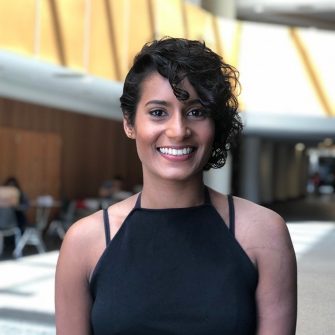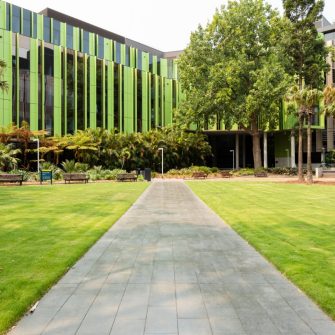Graduate Certificate in Ocular Therapeutics
- Commencing Terms
- Term 1
- Duration
- 0.5 - 3 Year(s)
- Delivery Mode
- Face-to-face (includes blended)
- Campus
-
Kensington
- Codes
- Program code 7436
-
Commonwealth Supported Places are available for this program2025 Indicative CSP first year fee
- $6,500*
-
2025 Indicative CSP fee to complete degree
- $7,500*
- $27,500*
- $28,500*

- Overview
- Entry requirements
- What will I study?
- Future careers
- How to apply
- Fees & Scholarships
Overview
The Graduate Certificate in Ocular Therapeutics is a one-year program accredited by the Optometry Council of Australia and New Zealand (OCANZ). You will study three part-time courses that cover the didactic and clinical components of ocular therapy. On completion of this specialised program you will be able to prescribe topical therapeutic agents effectively, safely and in line with relevant legislation to manage ocular disease in your optometry patients. This is also the longest active Graduate Certificate in Ocular Therapeutics in Australia, with an award-winning teaching team and a broad availability of clinical placement sites.
Please note the Graduate Certificate in Ocular Therapeutics is delivered every two years, with the next intake in 2026.
Why study at UNSW?
This program comprises self-paced online distance education modules as well as limited face-to-face sessions for clinical skill development, allowing you to learn flexibly and concurrently with your optometry practice.
Who should choose this degree?
Practising optometrists in Australia and New Zealand take this program to train in ocular therapeutics and gain therapeutic endorsement. Overseas trained optometrists without therapeutics education may also take this program as one part of becoming registered to practice in Australia or New Zealand, though noting this course is not open for International Students.
Want to see more from UNSW Medicine and Health?
Entry requirements
To gain entry to this program, students must:
- Have at least a three-year full-time AQF level 7 Bachelor degree in Optometry.
- Be local (Australia and New Zealand) candidates only.
This program is only open for Term 1 enrolments and is completed part time.
English language requirements
You may be asked to provide evidence of your English proficiency to study at UNSW depending on your educational background and citizenship. English language skills are vitally important for coping with lectures, tutorials, assignments and examinations - this is why UNSW requires a minimum English language competency for enrolment.
If you’re completing an Australian Year 12 qualification (e.g. NSW HSC or equivalent), you do not need to provide anything extra to prove your proficiency. Your qualification will be used as evidence of your English proficiency.
If you do need to provide evidence of your English proficiency, this will be indicated in your application. You can prove this by providing evidence that you meet one or more of the following criteria:
- English language tests and university English courses
- Prior study in the medium of English
- Other qualifications
If you need to improve your English skills before you start your degree, UNSW College’s Academic English Programs are for you. The programs are suitable for various English levels and help you prepare for university studies and life in Australia.
For more details, visit the English Language Requirements page.
English language requirements
You may be asked to provide evidence of your English proficiency to study at UNSW depending on whether you are from an English-speaking background or non-English speaking background. English language skills are vitally important for coping with lectures, tutorials, assignments and examinations - this is why UNSW requires a minimum English language competency for enrolment.
If English is not your first language, you’ll need to provide proof of your English proficiency before you can be given an offer to study at UNSW. You can do this by providing evidence that you meet one or more of the following criteria:
- English language tests and university English courses
- Prior study in the medium of English
- Other qualifications
If you need to improve your English skills before you start your degree, UNSW College’s Academic English Programs are for you. The programs are suitable for various English levels and help you prepare for university studies and life in Australia.
For more details, visit the English Language Requirements page.
Check the specific English language requirements for this program
Full program structure
Future careers
Graduates of this program can register with the Australian Health Practitioner Regulation Agency for therapeutic endorsement as an optometrist.
Accreditation
This program is an approved program of study of the Optometry Board of Australia and the Optometrists and Dispensing Opticians Board New Zealand.
How to apply
Applications must be submitted through our Apply Online portal. We encourage you to submit your completed application as early as possible to ensure it will be processed in time for your preferred term. Some high-demand programs and Faculties with limited places may have an earlier application deadline or commencement date. Find out more.
Ready to start your application?
For most international students, applications are submitted via our Apply Online, opens in a new window service. We encourage you to submit your completed application as early as possible to ensure it will be processed in time for your preferred term.
Some high-demand programs with limited places, may have an earlier application deadline or may have an earlier commencement date. For more information visit our international applicant information page.
Ready to start your application?
Fees & Scholarships
You may be eligible for a Commonwealth Supported Place (CSP) for this degree. Domestic students who receive a CSP will have a substantial proportion of their fees subsidised by the Australian government. Start your postgraduate application today with our guide on how to apply.
Commonwealth Study Assistance, such as Austudy and Youth Allowance, is available for some master’s degrees. For the most up-to-date information and list of degrees, visit UNSW Current Student Financial Support.
*The indicative Commonwealth Supported Place (CSP) fees are an estimate based on the relevant student contribution band/s for a Commonwealth Supported Place undertaking a standard full-time load of 48 units of credit per year (1 Equivalent Full Time Student Load/1 EFTSL). To find out more about Commonwealth Supported Places visit Postgraduate Commonwealth Support.
Indicative fees are a guide only and have been calculated based on the typical enrolment patterns of students undertaking the degree/program. The indicative fee listed here is an estimate for tuition only and excludes non-tuition fees and charges. The amount you pay will vary depending on the calendar year of enrolment, the courses you select and whether your study load is more or less than 1 Equivalent Full Time Student Load (48 units of credit (UOC) per year).
You should not rely on indicative fees as fee increases are assessed when required and may exceed the indicative figures listed here. Actual fees are calculated on enrolment. More information on fees can be found at the UNSW fees website.
*Fees are subject to annual review by the University and may increase annually, with the new fees effective from the start of each calendar year. The indicative fees listed here are based on an estimated average and are for tuition only, other fees and charges are not included. The amount you pay will vary depending on the calendar year to enrol, the courses you select and whether your study load is more or less than 1 Equivalent Full Time Student Load (8 courses per year).
Indicative fees are a guide for comparison only based on current conditions and available data. You should not rely on indicative fees. More information on fees can be found at the UNSW fees website.
Indicative fees to complete the program have been calculated based on a percentage increase for every year of the program. Fee increases are assessed annually and may exceed the indicative figures listed here.
Indicative fees to complete the program include tuition plus an estimate of study-related costs of approximately $1,000 per year. To find out more about other costs, visit UNSW International.
Scholarships
At UNSW, we award over $83 million in scholarships each year. We pride ourselves on rewarding excellence and making university accessible to students from all walks of life. Whether you’re a domestic or international student, our range of scholarships, prizes and awards can support your journey.

QS World University Rankings, 2025

AFR Top100 Future Leaders Awards, 2020-2025

#1 Australian uni attended by start-up founders





